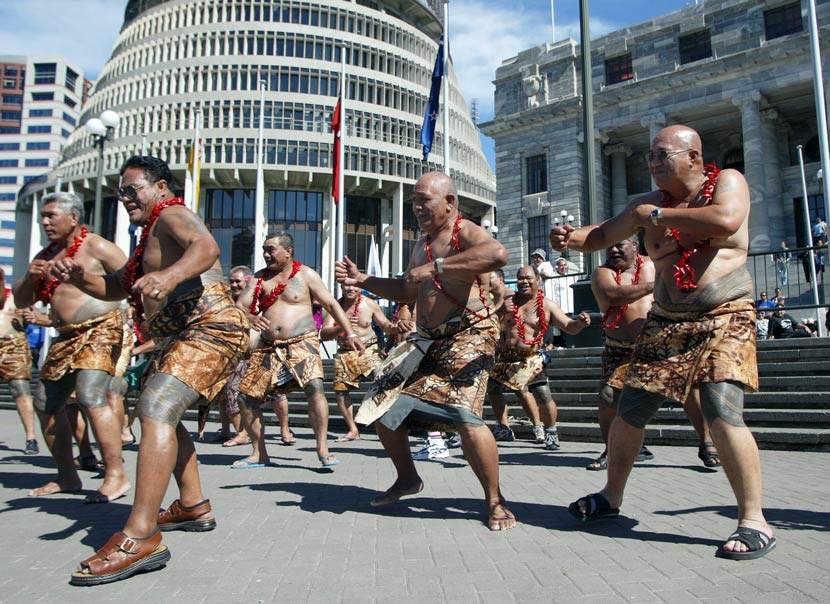Tattooed group of Samoans dancing in front of the New Zealand Parliament Building in protest over the 1982 Citizenship Act for Samoans.NZ HERALD PHOTO
By Staff Writer
The citizenship restoration bill for Samoans under the (Western Samoa) Act 1982 is being followed closely as it goes through the second reading before the New Zealand Parliament.
The HRPP opposition leader Tuilaepa Sailele Malielegaoi has been keeping close watch on the passage of the bill that re-visits the Privy Council ruling of 42 years ago granting New Zealand citizenship to Samoans.
In 1982 the NZ Parliament rushed through a law granting New Zealand citizenship to Samoan-born citizens then resident in New Zealand.
This was in response to a Privy Council ruling that had given citizenship to all Samoans born between 1924 and 1948 and their descendants.
The 1982 act remains a concern for Samoans resident in New Zealand who desire freedom of movement between the two countries.
In March 2003 a petition with 90,000 signatures calling for the law’s repeal was presented to Parliament.
Tuilaepa in his weekly Letter To The Editor circulated to the media highlighted several key issues behind the earlier reaction to the citizenship Act in New Zealand.
He headlined his media release ‘ New Zealand Responsibility For Tokelau, Cook Islands, Niue And Samoa.
The signed letter reads……
New Zealand, as the former colonial administrator of these 4 small Island Nations with little resources, should not abandon its responsibility to continue to provide assistance for their economic, political, and social development despite their independent or semi-independent status.
Many of our people are also citizens and residents of New Zealand where they have made a significant contribution to New Zealand’s stature as a nation highly regarded for its economic, social, and political stability, as well as its sporting prowess.
New Zealand is a second home to many Samoans, Cook Islanders, Tokelauans and Niuean.
Indeed, the gateway to Tokelau is through Apia and Tokelauans are always welcome to live in Samoa as Samoans.
This passage, requiring that travel to and from Tokelau be routed through Apia, was established by the New Zealand administration.
These four Nations must never be treated the same as other States in the Pacific that were administered by the UK, US, France and Australia who have pursued their own special relationships to date.
Indeed, the residents of the four Polynesian Island Nations will play a greater role in the political affairs of New Zealand in the future, more than they already do today: a reality that any New Zealand Government must carefully consider in all its policy formulation towards these four small Island Nations.
Too often, successive New Zealand Governments have used their non–interference policy to respond to our request for assistance in facilitating the Samoan business community’s efforts to work together with Air New Zealand and other New Zealand business interests.
To Samoans, this is a very weak excuse.
The issue of citizenship of New Zealand for Samoans born prior to 1949 by Law and Court of Appeal decision reflect the true nature of the New Zealand leaders’ farsighted view of the continuing friendly relationship between New Zealand and its former colonies, a view which is also reflected in our Special Treaty of Friendship of 1962 and which is yet to be fully honoured by the present generations of New Zealand leaders.
There are not many Samoans alive today who were born prior to 1949 to benefit from the Privy Council decision of 1982, and I hope this reality and the above-mentioned thoughts will be remembered in the 2nd reading of the Restoring Citizenship Removed By Citizenship (Western Samoa) Act 1982 Bill in the New Zealand Parliament which reopens the debate on the justice denied to Samoan citizenships of New Zealand, which the New Zealand Laws stipulated in the early 1920s and reconfirmed by the 1982 Privy Council decision.
New Zealand, which prides itself as a leader in social and political legislative reform in the Pacific, must continue to uphold that reputation by its actions and treatment of the citizens of these island Nations.
Tuilaepa Sailele Malielegaoi

Leader of HRPP
